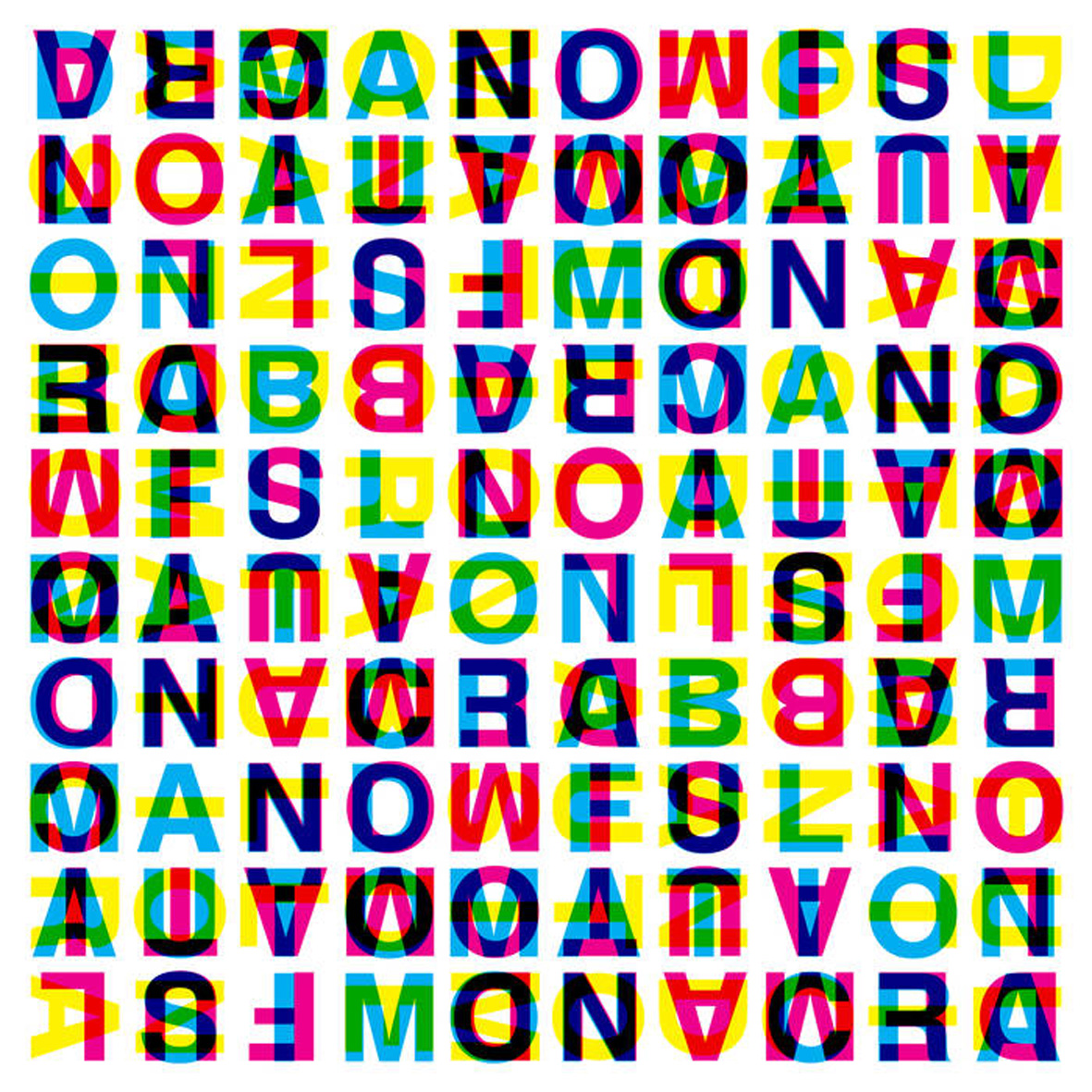Simon Crab, "Demand Full Automation"
 Three years after his eclectic and excellent solo debut, Bourbonese Qualk founder Simon Crab is back, albeit in radically transformed fashion. Crab's eclecticism certainly remains intact, yet Demand Full Automation is a bit of a tough album to wrap my head around: it kind of sounds like Crab started composing a similarly fine follow-up, then got commissioned to soundtrack some kind of neon-lit impressionist urban noir film…then took a break and time-traveled back to the '90s to do a DJ set at the Haçienda.  Unsurprisingly, those disparate threads make very strange bedfellows indeed, yet the enigmatic logic of Crab's overarching vision is countered by some sizable leaps forward in his craftsmanship. While I admittedly miss the homespun charm of After America a lot, Demand Full Automation is quite a likable (if sometimes quizzical) album in its own right, as it is a considerably tighter, more beat-driven, and more hook-filled affair than its predecessor.
Three years after his eclectic and excellent solo debut, Bourbonese Qualk founder Simon Crab is back, albeit in radically transformed fashion. Crab's eclecticism certainly remains intact, yet Demand Full Automation is a bit of a tough album to wrap my head around: it kind of sounds like Crab started composing a similarly fine follow-up, then got commissioned to soundtrack some kind of neon-lit impressionist urban noir film…then took a break and time-traveled back to the '90s to do a DJ set at the Haçienda.  Unsurprisingly, those disparate threads make very strange bedfellows indeed, yet the enigmatic logic of Crab's overarching vision is countered by some sizable leaps forward in his craftsmanship. While I admittedly miss the homespun charm of After America a lot, Demand Full Automation is quite a likable (if sometimes quizzical) album in its own right, as it is a considerably tighter, more beat-driven, and more hook-filled affair than its predecessor.
This album is quite an unusual convergence of curious artistic choices, unexpected anachronisms, and seemingly contradictory impulses roughly united by Crab's vision of Automation as a "futurist narrative" that "anticipates our world at a crossroads where either machines liberate the working class to pursue meaningful tasks, or automation is used as yet a another tool to subdue."In practical stylistic terms, Demand Full Automation is an album with very high production quality, as each song has been painstakingly polished to vibrant, crystalline clarity.There is also a very conscious mingling of organic instrumentation, modern electronics, deep human emotion, and exacting precision, albeit not always an entirely seamless one.While the glittering, crisp production is by far the most immediately striking surprise that Automation offers, Crab's restless genre-shifting is yet another unexpected curveball: in the past, Crab has assimilated a wide variety of disparate influences in a relatively distinct (if ever-evolving) aesthetic.He achieves that with Automation a few times as well, but more frequently chooses to completely give himself over to different aesthetics like a master spy trying on various disguises.That approach is where the album loses me a bit, as I would much rather hear Crab focusing his formidable talents on his own vision rather than crafting a series of skilled pastiches.  Occasionally, however, Crab's oddly retro pastiches can be quite good, as the opening "E11" is a lovely throwback to late '90s techno that marries burbling synths, a charmingly blooping melody, and a big, straightforward beat to great effect.The opposite end of the spectrum is the title piece, which sounds like a lost early '90s New Order instrumental (the height of their "dance" phase).Similarly flummoxing is "According to Plan," which sounds like an ABC remix recorded during New Jack Swing's brief window of popularity.
Fortunately, there are a number of legitimately excellent and inventive pieces lurking throughout Automation's kaleidoscopic trajectory as well.My favorite is the gorgeously elegiac "Drop," which beautifully embellishes a twinkling descending melody with dreamily blurred steel drums.The following "I Asked" is another stunner, as Crab is joined by guest vocalist Ksénia Lukyanova–Emelyanova and percussionist Milo Fell in crafting a piece that sounds like something that would be playing in a futuristic S&M club.While those two pieces are definitely the upper tier, the album is peppered with several other unique delights as well, such as the bizarrely lurching, burbling, and broken-sounding dub-techno experimentation of "Dark Harvest."  Elsewhere, the languorously lovely "The Long Days" feels like a warmer, slower variation on "Drop," as its plinking strings and wobbly steel drums weave a bittersweetly blissful spell. There are also some intriguing pieces that are a bit harder to categorize or seem like the complete antithesis of Crab's anarchist/anti-materialist worldview."Kubark," for example, is a very stylish and evocative blend of swooning melody and retro-sounding electro funkiness that would not seem at all out of place in a high-end cosmetics commercial or a fashion show.Elsewhere, the delicate and nakedly pretty "Permanent Emergency" sounds like an intricately rippling web of layered music boxes, which could not possibly be further from Crab's ultra-political cassette underground roots.Interpreted charitably, I suspect Automation can be viewed as a particularly evolved state of post-modernism in a world where rebellion has been commodified and reduced to a mere aesthetic–if overtly resembling revolutionary/countercultural art is ineffectual posturing in the face of late capitalism, then nothing is stylistically off-limits.The machine does not care whether you are using the Crass font or making pristine techno confections, as both will be commodities in the end.
Despite being an incredibly varied and occasionally puzzling album, Automation is a remarkably well-crafted whole in which each song flows seamlessly into the next.As far as songcraft and craftsmanship are concerned, this album is unquestionably the high-water mark of Crab's career, as almost nothing about Automation feels meandering, improvised, exploratory, or cluttered: nearly every piece is a stylish, masterfully executed gem of perfect focus.If Automation has a flaw, it is only that Crab's muse is quite a mercurial and enigmatic one.This album is like a tank being operated by someone prone to uncontrollable hallucinations: it is sometimes quite hard to guess why a particular target was chosen, but Crab definitely makes a significant impact at whatever winds up in his quixotically unpredictable crosshairs.Crab's newly polished and clean production aesthetic, combined with his baffling compulsion to craft anachronistic mainstream-sounding pop makes this album a bit of a baffling enigma, yet all of his weird decisions are beautifully crafted and enjoyable. Demand Full Automation is a lot like watching a great auteur direct a genre film or an installment of some long-running franchise: the result is stylish, skillfully executed, and quite good, but it just is not what that auteur will be remembered for. As such, I prefer After America and some late-period Bourbonese Qualk to this particular direction.Demand Full Automation's stellar execution and wealth of hooks would have been quite amazing if it had been in service of a more distinctive vision though.Hopefully, that convergence will someday come.Until then, Demand Full Automation is yet another strong and unusual album in a uniquely unpredictable career.
Samples:
 



